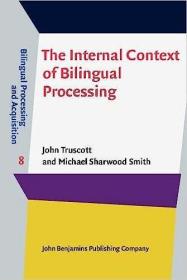
现货The Internal Context of Bilingual Processing[9789027204004]
¥ 919 九五品
库存5件
上海宝山
认证卖家担保交易快速发货售后保障
作者Truscott, John ; Sharwood Smith, Michael
出版社John Benjamins Publishing Company
ISBN9789027204004
出版时间2019-08
装帧精装
纸张其他
页数320页
正文语种英语
上书时间2023-08-08
- 最新上架
商品详情
- 品相描述:九五品
- 商品描述
- This book offers a broad-based account of bilingual processing, drawing on research findings and current thinking from various domains across cognitive science. The theoretical approach adopted is the Modular Cognition Framework in which language processing is characterized as an interaction between dedicated linguistic systems and the other modules of the human mind. The latter provide the ''internal context'' of bilingual processing. This internal context involves goals, value, emotion, self, and representations of the external context. The book combines all these elements into a coherent picture of the bilingual''s internal context and the way it shapes processing. It then shows how some central concepts in cognitive science and bilingualism fit in with - and follow from - this view. These concepts include working memory, consciousness, attention, effort, codeswitching, and the possible cognitive benefits of being bilingual. The book should be of interest to professionals in the field as well as postgraduate students and advanced undergraduates.
— 没有更多了 —
![现货The Internal Context of Bilingual Processing[9789027204004]](https://www0.kfzimg.com/sw/kfz-cos/kfzimg/17733071/b48764da491f2de1_b.jpg)

![现货Materials and Technologies of Modern Production[9783036401683]](https://www0.kfzimg.com/sw/kfz-cos/kfzimg/17733071/5fd2824531e165d7_s.jpg)
![现货Introduction to Container Ship Operations and Onboard Safety[9781032155425]](https://www0.kfzimg.com/sw/kfz-cos/kfzimg/17733071/58b7ff43ef7909ee_s.jpg)
![现货Electrophosphorescent Materials and Devices[9789814877343]](https://www0.kfzimg.com/sw/kfz-cos/kfzimg/17733071/18cc1d77bcb7b488_s.jpg)
![现货Organic Semiconductors for Optoelectronics[9781119146100]](https://www0.kfzimg.com/sw/kfz-cos/kfzimg/17733071/24c85a750c708964_s.jpg)
![现货Advances in Food Rheology and Its Applications[9780081004319]](https://www0.kfzimg.com/sw/kfz-cos/kfzimg/17733071/e0c11603c9119d4d_s.jpg)
![现货Advanced Materials and Sustainable Technologies[9783035727562]](https://www0.kfzimg.com/sw/kfz-cos/kfzimg/17733071/dced675333874c48_s.jpg)
![现货Advanced Materials and Manufacturing Engineering II[9783035712681]](https://www0.kfzimg.com/sw/kfz-cos/kfzimg/17733071/660ccfae75fa8d3e_s.jpg)
![现货Materials in Machinery and Construction[9783035718119]](https://www0.kfzimg.com/sw/kfz-cos/kfzimg/17733071/6f402060775e9daa_s.jpg)
![现货Cereal Grain Quality (Softcover Reprint of the Original 1st 1996)[9789401071772]](https://www0.kfzimg.com/sw/kfz-cos/kfzimg/17733071/f93ca1c96a97403a_s.jpg)
![现货The Internal Context of Bilingual Processing[9789027204004]](/dist/img/error.jpg)
以下为对购买帮助不大的评价